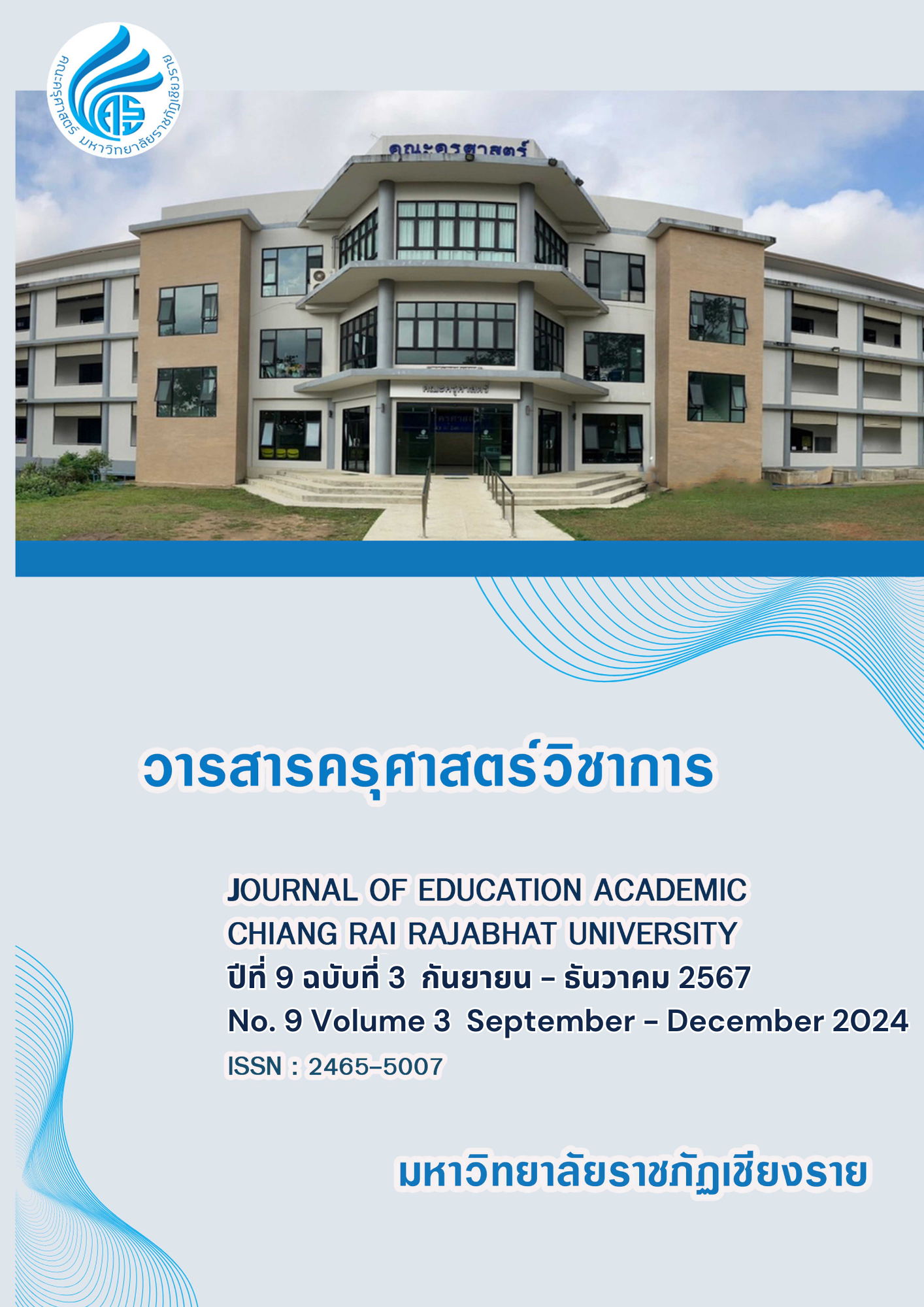การศึกษาภูมิปัญญาท้องถิ่นในการจัดการทรัพยากรน้ำเหมืองฝายของชุมชนลุ่มน้ำคำ จังหวัดเชียงราย
คำสำคัญ:
เหมืองฝาย , ภูมิปัญญาท้องถิ่น , ทรัพยากรน้ำ, ลุ่มน้ำคำบทคัดย่อ
บทความนี้มีวัตถุประสงค์เพื่อศึกษาภูมิปัญญาท้องถิ่นในการจัดการทรัพยากรน้ำของชุมชนลุ่มน้ำคำ และเพื่อศึกษารูปแบบและกระบวนการบริหารจัดการน้ำของชุมชนลุ่มน้ำคำ จังหวัดเชียงราย ใช้วิธีการวิจัยเชิงคุณภาพ เครื่องมือประกอบด้วยแบบโครงสร้างคำถามนำ การสนทนา การสัมภาษณ์ การสังเกต และแบบประเมินชนบทอย่างมีส่วนร่วม เก็บข้อมูลภาคสนามจากตัวแทนสมาชิกกลุ่มผู้ใช้น้ำเหมืองฝายจำนวน 30 คน และคณะกรรมการบริหารเหมืองฝายของชุมชนลุ่มน้ำคำ 6 เหมืองฝายเป็นการเลือกตัวแทนแบบเจาะจง ประกอบด้วยประธานและกรรมการ จำนวน 30 คน วิเคราะห์ข้อมูลในเชิงปฏิสัมพันธ์และการวิเคราะห์เนื้อหา ผลการศึกษาพบว่า ประการแรกภูมิปัญญาท้องถิ่นมีการวางระบบโครงสร้างชลประทานเหมืองฝายที่มีการจัดแบ่งระดับการจัดสรรน้ำ มีการจัดตั้งองค์กรบริหารจัดการจัดสรรน้ำ และมีการสร้างเครือข่ายทางสังคมผ่านการประกอบพิธีกรรมเพื่อเป็นกลไกการสร้างความร่วมมือของคนในชุมชนลุ่มน้ำ ประการที่สองรูปแบบการบริหารจัดการทรัพยากรน้ำเชิงบูรณาการอย่างยั่งยืนมี 2 รูปแบบ คือ 1) รูปแบบการจัดการระดับชุมชนพื้นที่ผู้ใช้น้ำจากเหมืองฝายและเหมืองฝายสาขาเป็นรูปแบบการจัดการน้ำในระดับชุมชนในกลุ่มเหมืองฝาย 2) รูปแบบการจัดการลุ่มน้ำในระดับเครือข่ายเหมืองฝายซึ่งเป็นการจัดการในระดับลุ่มน้ำ ข้อเสนอแนะในการนำไปใช้ประโยชน์หน่วยงานภาครัฐและ องค์กรปกครองส่วนท้องถิ่นต้องให้ความสำคัญและทำการสนับสนุนให้ชุมชนมีความเข้มแข็งในการจัดการทรัพยากรน้ำ ทั้งในรูปแบบการจัดการเหมืองฝาย การจัดการของเครือข่ายลุ่มน้ำ ซึ่งจะเป็นกลไกในการขับเคลื่อนการจัดการทรัพยากรน้ำให้เกิดความยั่งยืน
เอกสารอ้างอิง
คณะกรรมการลุ่มน้ำกกและโขงเหนือ. (2556). แผนบริหารจัดการทรัพยากรน้ำลุ่มน้ำกกและโขง(ภาคเหนือ) ปี 2557. (เอกสารอัดสำเนา). สำนักงานทรัพยากรน้ำที่ 1.
บุญชัย งามวิทย์โรจน์, สมทรง เจริญกัณฑูรย์, พงษ์พัฒน์ เสมอคำ. (2551). ภูมิปัญญาท้องถิ่นในการบริหารจัดการทรัพยากรน้ำ: กรณีศึกษาพื้นที่ลุ่มน้ำชี. (รายงานวิจัย). กรุงเทพฯ: ส่วนวิจัยและพัฒนาทรัพยากรน้ำ สำนักวิจัย พัฒนาและอุทกวิทยา กรมทรัพยากรน้ำ กระทรวงทรัพยากรธรรมชาติและสิ่งแวดล้อม.
ประเสริฐ ณ นคร. (2521). มังรายศาสตร์ หรือ กฎหมายพระเจ้ามังราย. กรุงเทพฯ: บูรพาสานส์.
พรพิไล เลิศวิชา, สุพชัย เมถิน, นนธชัย นามเทพ. (2552). เหมืองฝาย จัดการน้ำ จัดการคน บนพื้นฐานภูมิศาสตร์และวัฒนธรรม. สำนักงานกองทุนสนับสนุนการวิจัย.
เพ็ญสุภา สุขคตะ ใจอินทร์. (2554). ฟื้นเหมือง “ปัดฝุ่น” กฎหมายมังรายศาสตร์. เข้าถึงได้จาก http://botkwamdee.blogspot.com/2011/09/p1-2mr.html
วันเพ็ญ สุรฤกษ์. (2528). พัฒนาการทางประวัติความเป็นมาและการจัดการเกี่ยวกับระบบชลประทานในภาคเหนือของประเทศไทย. กรุงเทพฯ: สถาบันวิจัยสังคม จุฬาลงกรณ์มหาวิทยาลัย.
สถาบันสารสนเทศทรัพยากรน้ำและการเกษตร (องค์การมหาชน). (2557). การจัดการทรัพยากรน้ำชุมชนตามแนวพระราชดำริ. กรุงเทพฯ: มูลนิธิอุทกพัฒน์ในพระบรมราชูปถัมภ์.
สำนักงานทรัพยากรน้ำแห่งชาติ. (2562). แผนแม่บทการบริหารจัดการทรัพยากรน้ำ 20 ปี (พ.ศ.2561-2580). กรุงเทพฯ: สนทช.
เสถียร ฉันทะ. (2549). ข้าวมารดาแห่งธัญพืชของคนอุษาคเนย์: การจัดการความหลากหลายพันธุ์ข้าวของกลุ่ม
ชาติพันธุ์. เชียงใหม่: บริษัทวิทอินดีไซน์จำกัด.
เสถียร ฉันทะ. (2553). น้ำกับความขัดแย้ง: การต่อสู้ของชุมชนชาวนาลุ่มน้ำอิงตอนกลาง. วารสารนเรศวรพะเยา. 3(1).
Bedeke, S.B. (2011). Community-based Irrigation Water Management System: the Case of Deder District, East Hararghe, Ethiopia. Advances in Physics Theories and Applications, l(1).
Utami, A.S. & Oue, H. (2022). Traditional ecological knowledge in irrigation water management in Tanah Datar District West Sumatera. The 4th International Conference on Sustainability Agriculture and Biosystem. IOP Conf. Series: Earth and environmental Science, 1059(2022) 012036. Doi: 10.1088/1755-1315/1059/1/012036
ดาวน์โหลด
เผยแพร่แล้ว
ฉบับ
ประเภทบทความ
สัญญาอนุญาต
ลิขสิทธิ์ (c) 2024 วารสารครุศาสตร์วิชาการ มหาวิทยาลัยราชภัฏเชียงราย

อนุญาตภายใต้เงื่อนไข Creative Commons Attribution-NonCommercial-NoDerivatives 4.0 International License.






